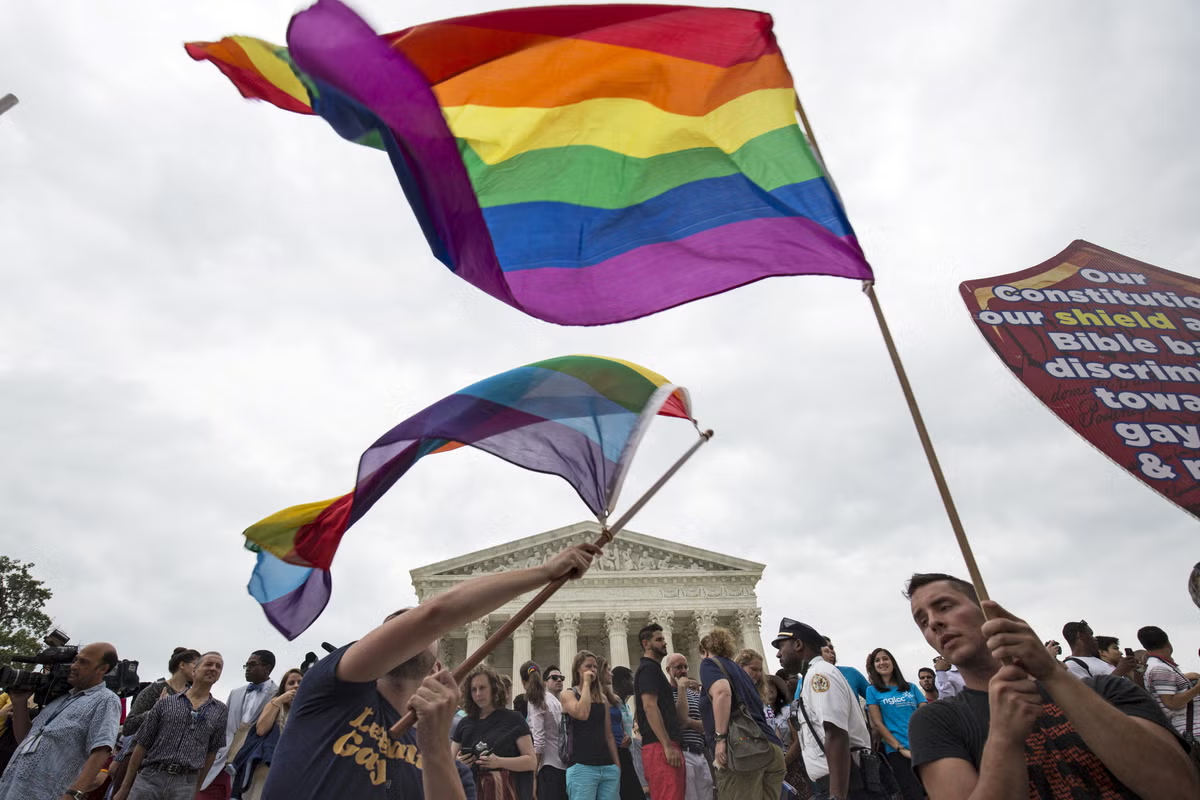Supreme Court takes swift action on Kim Davis bid to overturn same-sex marriage

Sign up for the daily Inside Washington email for exclusive US coverage and analysis sent to your inbox
Get our free Inside Washington email
Get our free Inside Washington email
The Supreme Court has swiftly rejected a longshot request to overturn the landmark decision that legalized same-sex marriage, leaving in place a decade-old ruling that upheld marriage equality across the United States.
Last week, justices met in their private conference to decide whether to take up new cases, including a request from Kim Davis, the former Kentucky county clerk who infamously refused to issue a marriage license to two men, citing her religious beliefs.
She called on the nation’s high court to reverse a court ruling that required her to pay more than $300,000 to the couple, and to take down the landmark decision in Obergefell v Hodges along with it.
The justices denied her petition Monday.
Legal experts were deeply skeptical that her petition would be accepted, but anxious same-sex couples and advocacy groups feared that the conservative-majority court was poised to once again debate LGBT+ rights under the guise of religious freedom.
open image in gallery
The Supreme Court swiftly rejected a longshot attempt to overturn the landmark 2015 decision that made same-sex marriage the law of the land (Reuters)
Davis, who is Christian, argued she had a First Amendment right as a public official to deny issuing licenses to same-sex couples, an argument that legal experts and LGBT+ advocacy groups said would effectively create a religious exemption that gave government employees a license to discriminate.
Mat Staver, chair of evangelical Christian legal group Liberty Counsel, which brought Davis’s appeal to the Supreme Court and demanded justices overturn same-sex marriage protections entirely, argued that Obergefell v Hodges “cannot override the free speech and religious exercise protections of the First Amendment.”
In her petition to the court, Davis’s attorneys argued that David Ermold and David Moore — the couple who won a case against Davis — cannot sue over “hurt feelings” suffered as a result of her “religious expression.” Without the Supreme Court’s intervention, Obergefell will remain an obstacle to the “First Amendment’s protections for public officials with sincerely held religious beliefs,” they argued.
Justices rejected the petition without argument and with no additional statements explaining their decision Monday.
“When public officials take an oath to serve their communities, that promise extends to everyone — including LGBTQ+ people,” Human Rights Campaign president Kelley Robinson said in a statement Monday. “The Supreme Court made clear today that refusing to respect the constitutional rights of others does not come without consequences.”
open image in gallery
A request from former Kentucky county clerk Kim Davis sought to overturn the landmark decision in her attempt to evade paying legal fees to the couple who sued her after she rejected their marriage license (AP)
At least 823,000 same-sex couples are legally married in the United States, according to research from the Williams Institute at UCLA School of Law. Nearly 600,000 of those couples married in the years after Obergefell.
Those couples are also raising nearly 300,000 children under the age of 18, the institute found.
Marriage equality also has broad public support, with more than two-thirds of Americans backing the 10-year-old ruling, according to Gallup. Support among Republicans, however, peaked at 55 percent in 2021 and 2022, and has slumped down to 41 percent, the lowest point since the first year after Obergefell was decided.
Same-sex couples who are currently married are also protected under the Respect for Marriage Act, which was signed into law by President Joe Biden in 2022, ensuring that same-sex marriages performed in one state are also recognized by others as well as by the federal government. But the law does not require every state to issue marriage licenses in the unlikely event that Obergefell is overturned.
That legislation was also supported by more than three dozen House Republicans.
Still, the idea of putting hard-fought protections for LGBT+ couples back on trial has frustrated and outraged advocates, who fear the worst under a conservative-majority court that liberal Justice Sonia Sotomayor says has broken the firewall between Church and state.
Legal experts have argued that the court’s decision in 2022 to end the constitutional right to abortion care, in Dobbs v Jackson Women’s Health Organization, reveals just how fragile those precedents can be.
In his concurring opinion in Dobbs, Justice Clarence Thomas suggested that the court could “reconsider” major cases involving “substantive due process precedents” — including the court’s landmark cases involving same-sex marriages, gay sex, and contraception.
In a statement Monday, Liberty Counsel’s Staver said the Supreme Court had “let stand a decision to strip a government defendant of their immunity and any personal First Amendment defense for their religious expression.”
“Like the abortion decision in Roe v Wade, Obergefell was egregiously wrong from the start,” he added. “It is not a matter of if, but when the Supreme Court will overturn Obergefell.”





